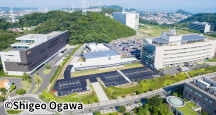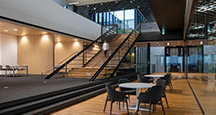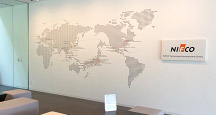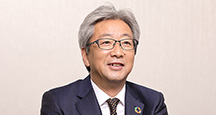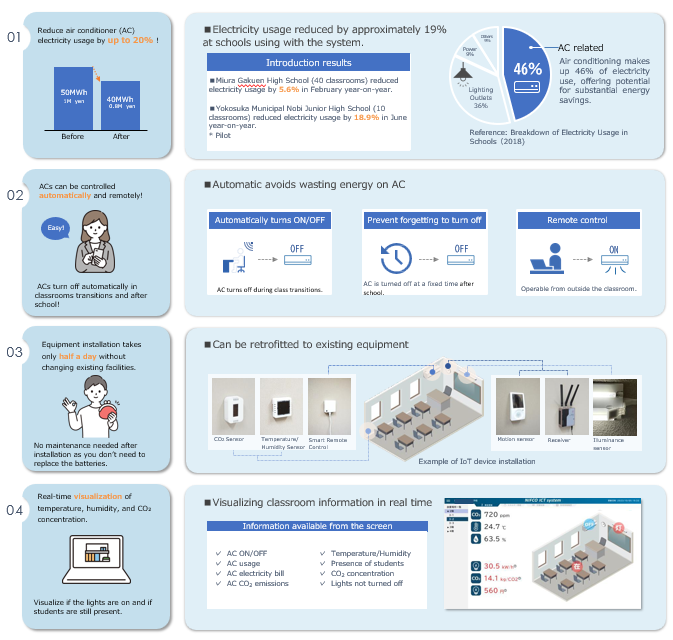Conducted in: February 2025
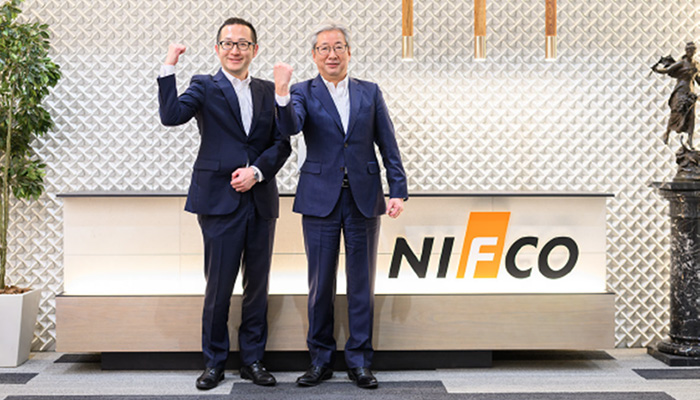
(Right) Masaharu Shibao, President and CEO
(Left) Takaaki Nakamura, General Manager, Life Solutions Company Connected Business Unit
Establishing the next growth engine by working on new businesses in both the automotive and non-automotive fields
Nifco is exploring new business ventures to further grow in the future. One is in the automotive and the other in the non-automotive field, but here we discuss the non-automotive field, a new arena for us. We will interview President Shibao and General Manager Nakamura about their approach to and issues surrounding new business ventures, using the example of “battery-less devices" that are serving to address environmental problems and future population decline.
Uncertainty clouds the future of the automobile industry, and overreliance on a specific business field poses risks for the future
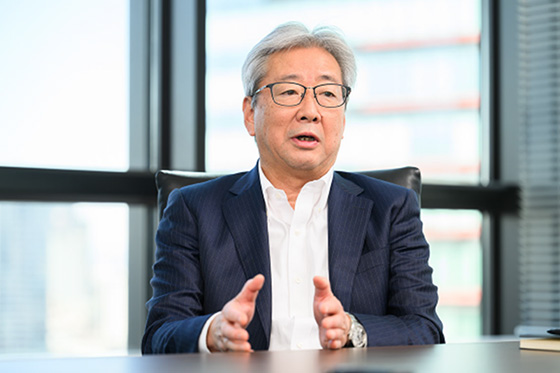
Shibao: When I returned from my assignment in Spain in 2006, Nakamura was already a new employee in the R&D Division.
Nakamura: That's right. At that time, Shibao was the head of the R&D Division and my direct superior. When I was looking for a job at Nifco, their motto was “In search of idea people." I had a hunch that this was the company for me, so I joined the company with great enthusiasm and would always write in my internal self-reports, “I want to start a new business! I want to start a new business!" (laughs)
Shibao: Right now, about 90% of Nifco's sales come from our automotive parts business, and this figure has been stable. However, numerous uncertainties cloud the future of the automotive industry, and the company's business structure that is heavily dependent on the automobile parts sector could pose a risk factor going forward. To hedge against these risks, Nifco is focusing on developing new businesses, including in non-automotive fields. As I also participate actively in launching new businesses in both the automotive and non-automotive fields, I aim to successfully develop these businesses to achieve sustainable growth for Nifco. As part of this, Nakamura is in charge of launching new businesses in non-automotive fields.
Nakamura: That's right. The non-automotive Life Solutions Company that I work for is made up of two core business units (Housing & Lifestyle Business Unit and Fitting Gear Business Unit) and two business exploration units (Connected Business Unit and Wellness Business Unit). The Connected Business Unit is a department that connects companies and builds a “co-creation system" that facilitates utilizing one another's resources, while also discovering new businesses that use IoT and conducting operations aimed at commercializing products and services. Its collaborative circle has expanded to approximately 20 companies, including Nippon Telegraph and Telephone East Corporation (NTT East) and Marubeni Information Systems Co., Ltd.
An encounter with Germany's EnOcean sparks inspiration
--Please tell us about the new business you are in charge of.
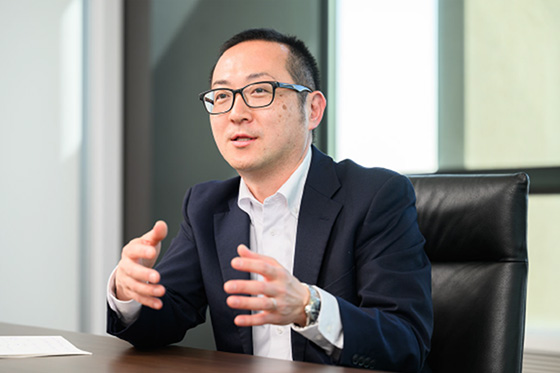
Nakamura: We are currently working on a business that involves “battery-less devices." These devices can be used as a variety of sensors, and because they have a power generation unit built into them, they can operate without batteries and do not require wiring. There are three main methods for powering them: electromagnetic induction, photovoltaic conversion, and generation from temperature differences. They are environmentally friendly and their installation is simple as they do not require wiring materials. This not only reduces manpower but also the resources (people, transportation of goods, etc.) required for installation. This technology is already commonplace in Europe and is used in light switches and other devices. EnOcean, a German spin-off from Siemens, holds strong patents that are unrivaled in the industry. While we were searching for what to do as a new business, we came across EnOcean in 2019 and thought it might have potential.
Shibao: It was very astute of you to pick up on battery-less devices. Most people wouldn't even pause on seeing or hearing abput them. But you did pause, so good on you.
Nakamura: We thought battery-less wafers would complement Nifco's other business. While EnOcean is good at making power generation units and sensor boards inside devices, it has no expertise in making plastic parts. So, we thought, wouldn't it be amazing if Nifco, which does have that expertise, came along and used its own parts to market a battery-less device? EnOcean and Nifco saw eye to eye on the idea, and we embarked on the project together. Nifco has since built up a strong collaborative relationship with the company, and our business has been fully underway since 2022.
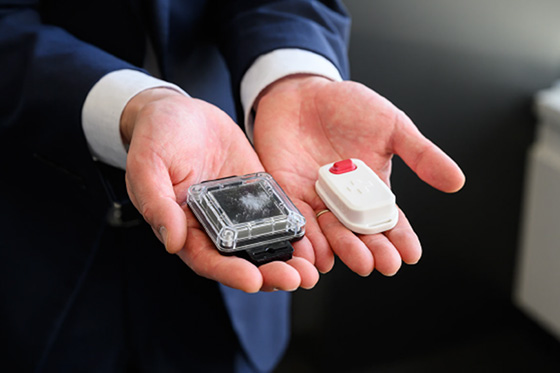
Battery-less device developed by Nifco
Focus on the education sector, where digital transformation has lagged
--What specific initiatives are you taking?
Nakamura: We have begun rolling out a Nifco original solution for schools called “PLUSchool®," which utilizes battery-less devices to solve various problems in schools (See figure below). Installing battery-less devices such as CO2 sensors, temperature and humidity sensors, motion sensors, and light sensors in classrooms, allows for optimizing the classroom environment so that students can concentrate on their lessons. Also, without leaving the teachers' lounge, teachers can remotely check whether students have stayed behind or forgotten to turn off the lights. This is a service that improves the educational environment while significantly reducing the operational burden on teachers. Automatic control of air conditioning can also reduce electricity usage and CO2 emissions.
--Could you talk about why you decided to install battery-less devices at schools?
Nakamura: While conducting proofs of concept to identify new business ventures and exploring potential target customers, Nifco found that the education sector was lagging behind the corporate sector in adopting digital transformation (DX). We also realized that the education sector had many issues, both potential and apparent, and that there were almost no competitors due to high barriers to entry. We feel that these business conditions would be highly compatible with Nifco's specialty, our “customer-intimacy business style."
--How many schools are now using your services?
Nakamura: Miura Gakuen High School (Yokosuka, Kanagawa Prefecture) and Nifco jointly conducted a proof of concept in 2022, and the school later officially requested that we continue the service. Shudo Senior High School (Hiroshima city, Hiroshima Prefecture) has begun using our service as well. We have also received numerous inquiries and started proofs of concept at high schools in Tokyo. Customers gave us encouraging feedback from a school where the system has been introduced. Thanks to visualization of CO2 concentrations in classrooms, they have been able to notice when to ventilate, leading to sufficient ventilation which is effective in preventing infectious diseases such as influenza.
A service that addresses “labor shortages," a major societal issue
Shibao: As an executive, I'm very concerned about the progress that's been made. How long do you think it will take to reach a profit that is satisfactory from a managerial standpoint?
Nakamura: If we divide the period from launching the business to when it starts to make real profits into three stages, I believe we have now passed the second stage and are entering the third and final stage. Businesses generally start to grow quickly at this stage, so we are working hard to achieve profitability as soon as possible. We've gotten supportive feedback from within the company about these battery-less devices, for example, “This seems like an area where Nifco can play an active role" and “This looks like a business where we can make good use of the strengths Nifco has cultivated over the years." We are also planning to soon introduce these devices for a heatstroke prevention tool in public junior high schools in the city of Yokosuka.
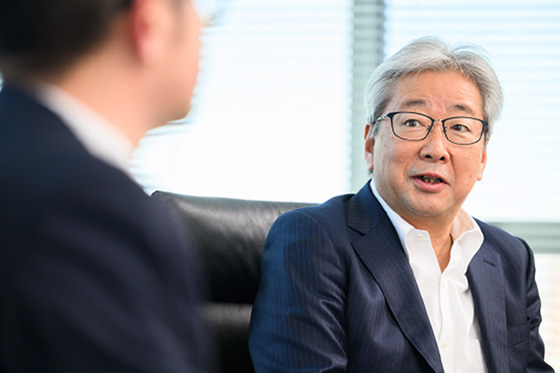
Shibao: “PLUSchool®" is one of our battery-less device services. However, as Nakamura explained earlier, it can greatly reduce the operational burden on teachers, meaning that this service actually tackles a major societal issue: the labor shortage caused by Japan's declining population. I believe that is the fundamental reason why the service has gained support within the company. Therefore, while I generally support the battery-less device business, I am looking forward to making even greater strides in the third stage, and hope to see you broaden your horizons in this business area to see if there are other areas in which the service can be developed.
Nakamura: If we can achieve success with our service for schools and build up a track record, I believe we can find success in a variety of other industries.
Shibao: The battery-less device business is one solution to the societal issue of labor shortages. But it is just one possible solution. I would like to see you expand our lineup of other solutions to meet labor shortage-induced demands and needs among a variety of customers, and to build new businesses that will become profit generators alongside automotive parts.
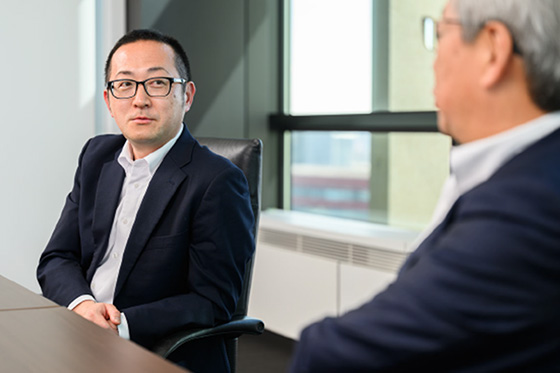
Nakamura: Although it won't happen overnight, I’m working on training personnel in order to entrust the new businesses to them. Right now, my subordinates are working hard on steps to prevent heatstroke at the public junior high school in Yokosuka that I mentioned earlier. However, advancing a new business in a non-automotive field requires a comprehensive skill set that includes handling sales and design, understanding manufacturing, and building networks with other companies. Without them, you won't even get off the starting line, so it takes time.
Shibao: The most important thing is passion for pursuing new business. Even if you're trying to sell the same thing, passion is an essential element to succeed. One who is passionate will study sales, design, and manufacturing, and will make an effort to build networks with other companies.
Nakamura: Everyone in our department is passionate about new business ventures. In my opinion, they need to become accustomed to responsibility for understanding what they want to work on, turning it into a product or service, and making a profit. We are currently working to make an environment where each person is in charge of a specific task in order to become accustomed to taking on responsibility, starting from small levels. If this works well and extends to younger generations, I expect the pool of talent for engaging in new business to become significantly deeper in five to ten years' time.
Providing products and services that meet the latent needs of the world
--Are you working on anything outside of battery-less devices?

Nakamura: Thanks to PLUSchool®, teachers have become interested in Nifco, a manufacturing company. They have asked us if there is anything Nifco can do as inquiry-based learning that is part of the high school curriculum. I think we will provide students with an educational program that involves manufacturing. Last year, we ran a program at a high school where students proposed businesses to Nifco, and we had them watch a video we made explaining what kind of company Nifco is. Afterwards, some said that they wanted to join the company. This shows that raising awareness about Nifco by cooperating with inquiry-based education at high schools could lead to securing future talent.
Shibao: As Nifco is a B2B company, it's not yet well known among the general public. These activities also have the benefit of helping with recruitment branding.
Nakamura: We are also looking overseas for potential new business ventures. One example here is the Housing & Lifestyle Business Unit within Life Solutions Company. It handles parts for housing facilities, and while the number of housing starts in Japan had been 850,000 a year until two or three years ago, due to population decline and other factors, this is expected to fall to around 600,000 by 2030, resulting in a smaller market. Meanwhile, in India, 7 million houses are still being built each year. As the population there grows, the number of housing starts is expected to continue to increase. For this attractive market in India, we hope to sell battery-less devices along with the home appliance parts that we mass-produce.
Shibao: What's important in this case is not to simply bring in the products and services we already have, but to explore what is truly needed in the Indian market. The reason Nifco has seen such growth is because it created a new automobile part called the plastic fastener. It had advantages compared to using conventional metal screws, nails, bolts, and nuts, including reducing labor hours in automobile production, making car bodies lighter, and not rusting. Although some things can only be achieved with metal parts, However, as motorization progresses, plastic fasteners could address a latent need in the automotive industry. Going forward, Nakamura, I hope to see you approach new business ventures with a broad perspective and with a view to providing solutions to societal issues.
Nakamura: Yes, understanding what the needs of the world will be in the future is critical to creating the foundation for a new business.
Developing new business as a means to realize sustainable growth and increase corporate value
Shibao: New business development is inherently challenging, and a crucial part of it is the process of looking at the many ideas presented and identifying those that can truly create value. In this context, concentrating investments in areas where we can leverage our strengths will increase our chances of success. Another important thing is to set a deadline. Once a new business is launched, it needs to meet the conditions for continuing: entering into a growth stage within about five years, making a solid profit, and having a clear vision for the future. Moreover, in the interest of optimally allocating management resources, one must regularly review the business portfolio to maximize investment efficiency.
Nakamura: If you think about it that way, battery-less devices are now entering a growth stage. Our goal for the third and final stage is to steadily increase sales and profits.
Shibao: Nifco has been a very successful company. There has been a formula for this success, and I don't see that formula failing us in the next 20 years or so. Business performance is also good. However, sustainably increasing corporate value is going to require further growth strategies. In order to demonstrate our future growth potential to the market, we must continue to try new things. That's where new businesses come in. We want to create the next growth engine through new business ventures. In our Mid-Term Management Plan (FY2024 - FY2026), we have established a budget of several tens of billions of yen to invest in new businesses, including M&A. My mission is to put this to good use. I want our employees to build a new business that can become the kind of growth engine that we'll really want to invest in. Nakamura, your unit is one of the teams tackling this difficult challenge. Though I know I've made a number of requests of you, I have high expectations.
- CEO: Nifco's Sustainability Management
- General Manager of Finance & Accounting Department: Financial Strategies to Support ESG Management
- Message from Outside Directors
- Roundtable Discussion: Between the President and Employees Involved in Technology
- Dialogue: Nifco's Response to Climate Change
- Dialogue: Nifco's concept of human capital

